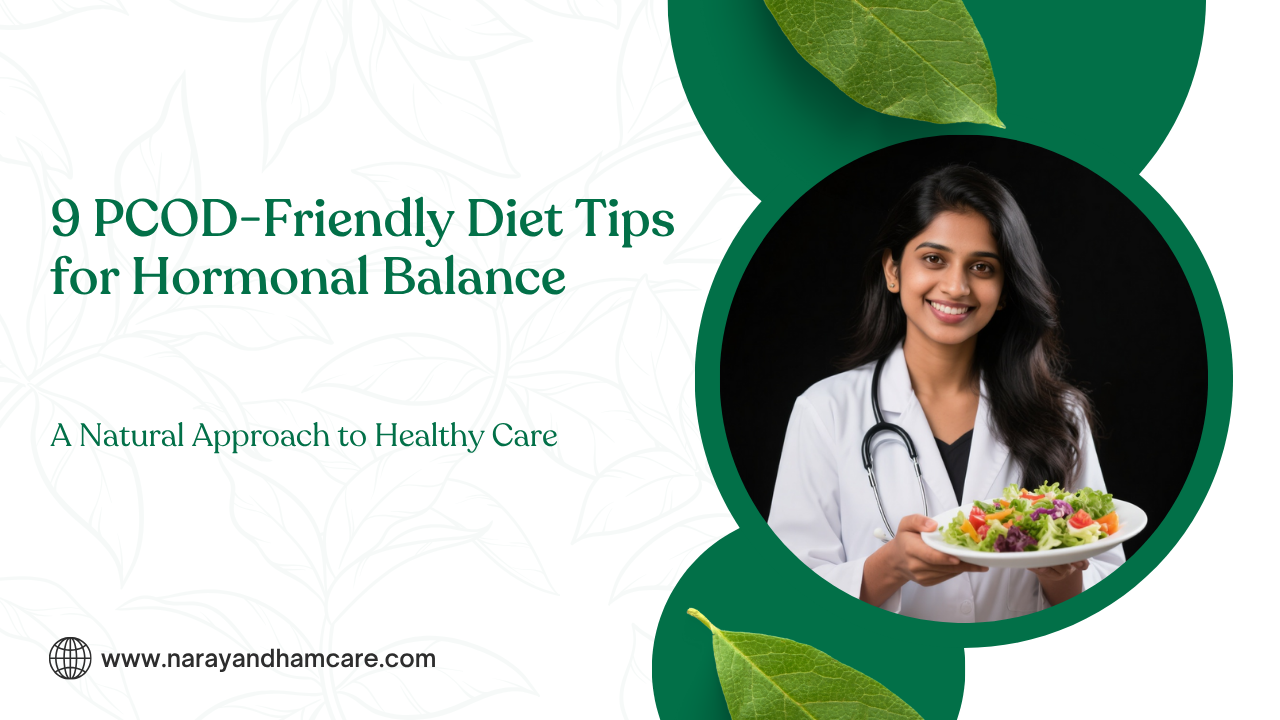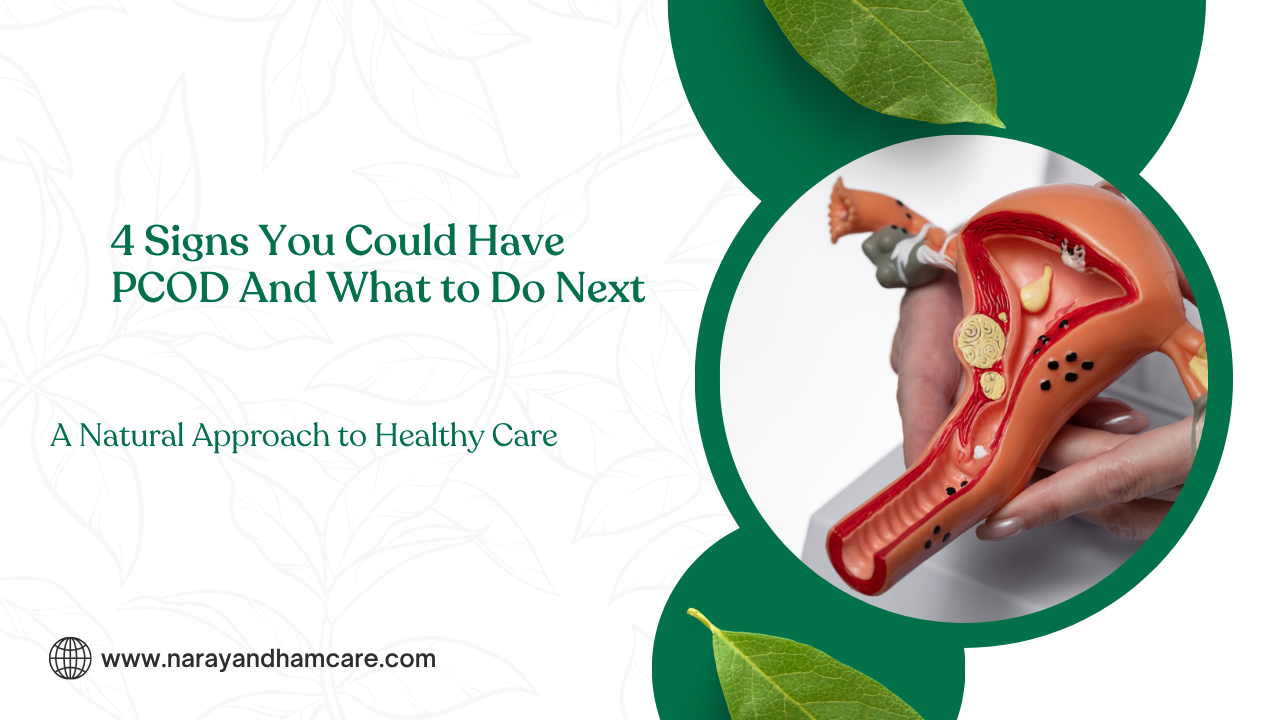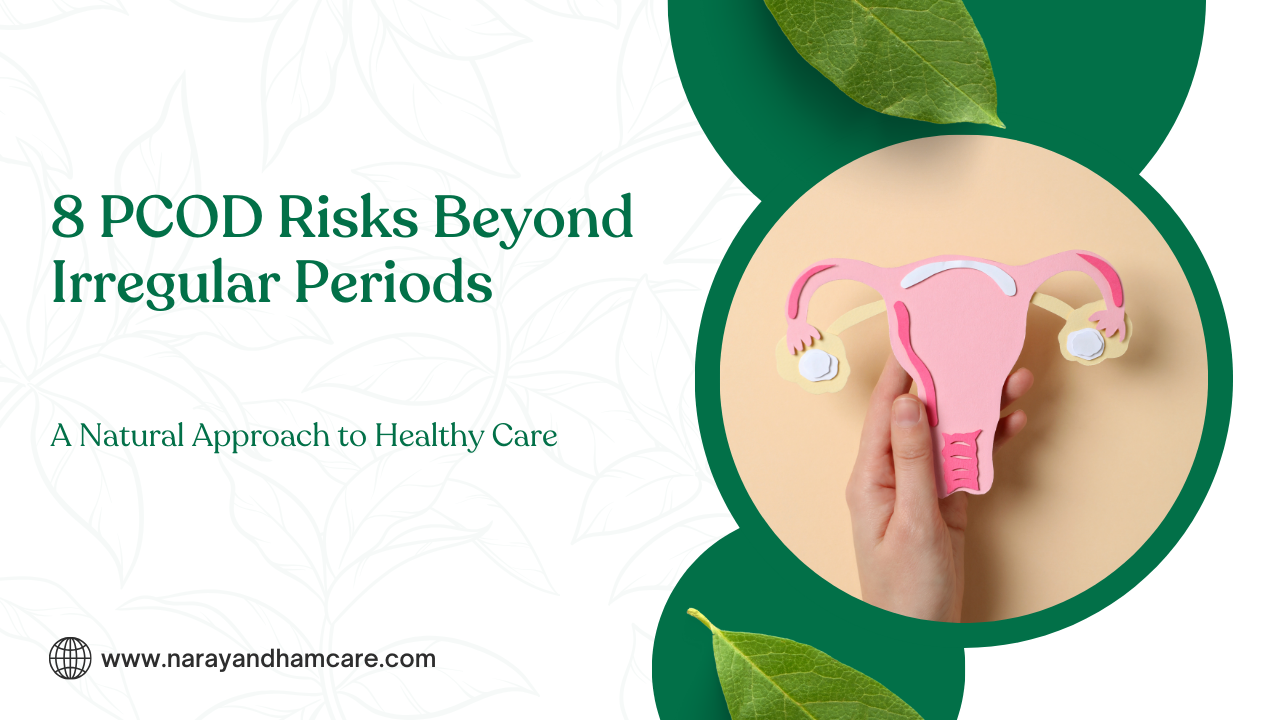🔹 Introduction
Polycystic Ovarian Disease, also known, is a common hormonal disorder affecting women of reproductive age. It can lead to irregular periods, weight gain, acne, unwanted hair growth, and even fertility problems.
The good news is that diet plays a major role in managing. By eating the right foods, you can balance your hormones, improve your cycle, reduce symptoms, and feel more energetic.
In this blog, we’ll share 9 easy and effective PCOD-friendly diet tips to help you naturally manage your health and support hormonal balance — without harsh medicines.
🔹 Problem: PCOD and Hormonal Imbalance
it happens when a woman’s ovaries produce more androgens (male hormones) than usual. This leads to:
- Irregular or missed periods
- Cysts in the ovaries
- Difficulty in ovulation (affecting fertility)
- Insulin resistance (body doesn’t use insulin properly)
- Weight gain, especially around the belly
Unhealthy eating habits make these problems worse. A poor diet can lead to blood sugar spikes, weight gain, and more hormonal imbalance.
🔹 Symptoms: Common Signs
Here are common symptoms that suggest you might have:
- Irregular periods or no periods at all
- Weight gain or trouble losing weight
- Oily skin or acne
- Hair thinning on the scalp
- Excess hair on the face or body
- Fatigue and mood swings
- Difficulty getting pregnant
These symptoms vary from person to person, but a healthy, natural diet can reduce them effectively.
🔹 Solution: 9 PCOD-Friendly Diet Tips for Hormonal Balance
Here are 9 simple and natural diet tips that can support hormonal balance and reduce symptoms:
- Choose Low Glycemic Index (GI) Foods
Low-GI foods help manage blood sugar and insulin levels, which are key.
- Eat: Brown rice, oats, whole wheat, quinoa, lentils
- Avoid: White bread, sugar, bakery items, soft drinks
Keyword: insulin resistance friendly foods
- Add More Fiber to Your Diet
Fiber slows down digestion and reduces insulin spikes. It also helps with weight control.
- Eat: Beans, leafy greens, flaxseeds, fruits with skin (like apples and pears)
- Start your day with warm lemon water and chia seeds
Keyword: diet plan weight loss tips
- Balance Your Plate With Protein
Protein keeps you full and helps maintain blood sugar. It’s great for hormone support and fat loss.
- Eat: Eggs, paneer, sprouts, tofu, dals, seeds, and nuts
- Avoid: Deep-fried snacks and excess cheese
Tip: Include some protein in every meal.
- Cut Down on Dairy and Gluten (if sensitive)
Some women are sensitive to dairy and gluten. These can cause bloating, acne, and inflammation.
- Try dairy-free options like almond milk or coconut milk
- Choose gluten-free grains like jowar, bajra, or rice
Note: Not all women need to remove dairy or gluten — test and observe how your body responds.
- Eat Healthy Fats
Good fats help produce hormones and reduce inflammation.
- Eat: Coconut oil, ghee, avocados, nuts, seeds, and olive oil
- Avoid: Refined oils, fried foods, and trans fats
Keyword: foods for hormonal balance, anti-inflammatory diet
- Avoid Sugar and Processed Foods
Sugar increases insulin levels, which makes PCOD worse. Processed foods also cause weight gain and mood swings.
- Replace sweets with fruits, dates, or jaggery in moderation
- Avoid biscuits, chips, sodas, and sugary drinks
- Include Anti-Inflammatory Foods
PCOD is linked to inflammation in the body. Eating anti-inflammatory foods helps reduce symptoms.
- Eat: Turmeric, ginger, amla, green tea, leafy vegetables
- Drink: Warm water with turmeric or ginger tea daily
Keyword: natural remedies, anti-inflammatory diet
- Stay Hydrated
Water helps flush out toxins, improves digestion, and supports hormone function.
- Drink 8–10 glasses of water daily
- Add herbs like tulsi or mint to your water for extra benefits
- Follow an Ayurvedic Eating Routine
Ayurveda suggests mindful eating to balance hormones.
- Eat warm, fresh meals (avoid leftovers and cold food)
- Have early dinners (before 8 PM)
- Include herbal teas like cinnamon, fenugreek, or fennel
Keyword: Ayurveda diet for hormonal balance, natural diet plan
🔹 Frequently Asked Questions (FAQ)
Q1. Can diet alone cure PCOD?
A: While diet cannot “cure” completely, it can significantly reduce symptoms and restore hormonal balance over time.
Q2. What is the best breakfast for PCOD?
A: A protein-rich breakfast with oats, nuts, chia seeds, or sprouts is ideal for balancing blood sugar and hormones.
Q3. Is dairy bad for PCOD?
A: Some women with are sensitive to dairy. Try removing it for a few weeks and observe changes in symptoms.
Q4. Can Ayurveda help in PCOD management?
A: Yes. Ayurveda offers herbs, diet changes, and lifestyle practices that help balance hormones naturally.
Q5. What are the worst foods for PCOD?
A: Avoid refined sugar, white flour, fried snacks, soft drinks, and processed foods as they worsen symptoms.
🔹 Conclusion
it can be challenging, but a healthy, natural diet makes a big difference. By making small daily changes — like eating more fiber, cutting sugar, and choosing anti-inflammatory foods — you can support your hormones and feel more in control.
Listen to your body, eat mindfully, and stay consistent. These 9 diet tips are simple but powerful steps toward healing your hormones and improving your health.
Start your PCOD-friendly diet today — one meal at a time.
Have a question or personal tip to share? Leave a comment below — we’d love to hear from you!





